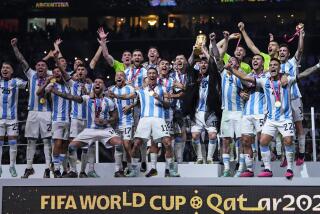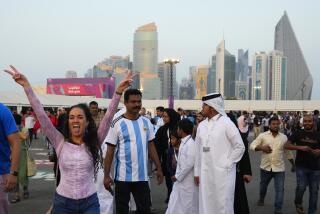Caribbean Islands Scramble to Prepare for Cricket World Cup
- Share via
ST. GEORGE'S, Grenada — There is no dead of night in this once-idyllic capital, as hundreds of Chinese workers jackhammer and steamroll round-the-clock in a race to rebuild a stadium destroyed 19 months ago by Hurricane Ivan.
Grenada is scrambling to make up for months of lost time to get Queen’s Park stadium ready for International Cricket Council inspections that start this month for the 2007 World Cup that is to be held jointly by nine Caribbean countries.
Playing host to the cricket world’s most prestigious championship could boost the image of island states seldom in the international spotlight, but construction delays, cost overruns, labor disputes and corruption scandals are simultaneously threatening global embarrassment and political disaster.
“There are stadiums that are several weeks behind at this point. Grenada’s is one for sure,” says Donald Lockerbie, venue development director at ICC Cricket World Cup 2007 headquarters in Jamaica.
But with the stakes so high for the host governments, which risk losing their part of the event to another nation, Lockerbie says he is confident all 12 new stadiums and 20 major upgrades will be completed by the Oct. 31 deadline. Each nation will have a competition pitch along with practice fields for the 16 teams in the tournament, which is held every four years.
“I would think that if any country failed at the Cricket World Cup that the government would collapse, and no one would want to see that happen,” Lockerbie says. The event is the first major sports tournament to be held in the West Indies.
But with the June onset of the rainy season looming and a cement shortage on some islands, organizers and fans are getting nervous.
“Right now, I believe that a much greater effort is being made to be ready for the World Cup series, and barring a bad hurricane season, the countries should be ready,” says Ronald Sanders, a retired diplomat and sports analyst from Antigua and Barbuda. “The question remains, however, whether they will recoup benefits from the large capital they have to outlay.”
Few of the host nations have disclosed their total spending on the tournament, burying event costs in their public works budgets. Lockerbie estimates the collective cost to be upward of $800 million -- more than the net worth of five of the host countries.
National organizing committee officials predict tourism increases from the event, not just from the 100,000 fans expected to travel to the islands specifically for cricket but also from visitors over the long term as the venues’ tropical splendor is showcased for the sport’s estimated 2.2 billion television viewers.
“The ICC Cricket World Cup will put St. Kitts and Nevis on the world map,” Ricky Skerritt, a state minister responsible for sports and tourism who is a former West Indies cricket team manager, told his counterpart from Australia during a recent visit. The Australians are the defending world champions.
Several Caribbean nations play together as the West Indies team in international events.
The smallest of the host countries is St. Kitts and Nevis, with about 45,000 residents. Nonetheless it is better positioned to deal with the cricket event than other islands because of its existing high-end accommodations. Trinidad and Tobago, flush with oil and gas revenue, is behind in its construction projects but reportedly ready to step up the pace and spending.
But cash-strapped islands such as Grenada, Barbados and St. Vincent and the Grenadines have been warned by ICC inspectors that they need to make up time or risk losing their matches to better-prepared venues.
Barbadian Prime Minister Owen Arthur in February personally took over direction of his country’s preparations, set back in part by a scandal involving the hiring of illegal immigrants at the job sites.
In St. Vincent and the Grenadines, Prime Minister Ralph Gonsalves has expressed concern about major cost overruns at the Arnos Vale field under construction. He has maintained his country’s commitment to hosting the warm-up matches but warns that recovery of the $11-million investment will be long-term at best.
Nowhere, though, does work seem as far behind as in Grenada, where Hurricane Ivan wiped out Queen’s Park stadium in September 2004 and washed out roads and bridges throughout the island. China, which two years ago persuaded Grenada to drop its recognition of Taiwan, offered to foot the $40-million bill for the stadium’s reconstruction and has flown in laborers to man the 24/7 operation. China is not competing in the World Cup.
Barry Collymore, spokesman for Prime Minister Keith Mitchell and a member of the Grenada World Cup board, says playing host to the Super-8, or quarterfinals, is vital to Grenada’s economic future and self-image.
“The World Cup provides an opportunity from a marketing standpoint and will give us a legacy of high-quality facilities,” he says, predicting a rise in tourism.
But those pushing for more public disclosure on the bite to state coffers note that the biggest cricket powers are half a world away in Britain, South Africa, India, Pakistan, Sri Lanka and Australia.
“If they want to go to the beach, they’ll go to Bali,” Peter David of Grenada’s opposition National Democratic Congress says.
Ordinary Grenadians are conflicted, eager to welcome the cricket world but worried about running up debts that may haunt them for decades.
“It’s a point of pride for us now, whether or not we can afford it,” says George Mitchell, a schools inspector.
Kishawn Thomas, a 22-year-old journalist, says most Grenadians remain supportive of the tournament but are chafing under the need to invest millions to meet tournament requirements of expanding the hospital, airport, roads and bus fleet.
Home to about 100,000 people, Grenada will have to accommodate an estimated 35,000 visitors during the matches, which is likely to overwhelm a hotel industry still rebuilding after Ivan damaged all but a few of its 1,000 rooms. That could give rise to bed-and-breakfasts, but community development specialist Denyse Ogilvie points out that government demands for hefty licensing fees, insurance and service guarantees are deterring most would-be innkeepers from making the investment.
Even the prospects for souvenir sales are dim, as few Grenadians can afford to pay franchise costs for use of ICC event names and logos.
Politicians across the islands have been careful to direct their criticism at the slow pace of preparations and the potential for excess spending, as playing host to the cricket world’s equivalent of the Super Bowl or the Olympics is a source of intense pride for a region that embraced their British colonizers’ game as an opportunity to defeat them.
David says his party supports Grenada’s role as host but wants to see a cost-benefit analysis to be convinced the investment is sound and “not just an emotional thing.”
More to Read
Sign up for Essential California
The most important California stories and recommendations in your inbox every morning.
You may occasionally receive promotional content from the Los Angeles Times.













